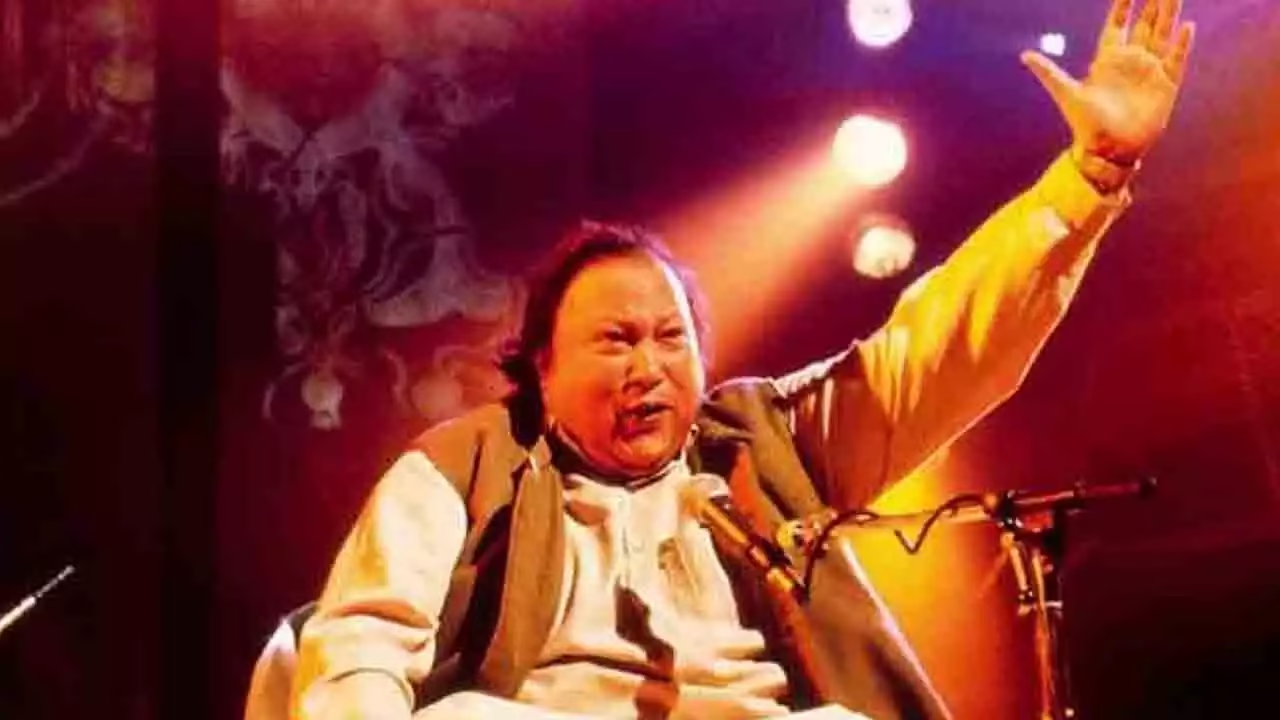The Nusrat Fateh Ali Khan legacy remains one of the most powerful and enduring in South Asian music history. Born in Faisalabad in 1948, Nusrat Fateh Ali Khan rose from a local qawwal family to become a global icon who transformed the centuries-old art of qawwali into an international phenomenon. Through his mystical poetry, ghazals, and soul-stirring performances, he bridged cultures and touched millions of hearts across the world.
Early Life and Musical Roots of Nusrat Fateh Ali Khan
The story of Nusrat Fateh Ali Khan begins in a household steeped in classical music. His father, Ustad Fateh Ali Khan, was a renowned qawwal who laid the foundation for his son’s early training. Initially, Nusrat was expected to pursue a more conventional career, but destiny had other plans. His extraordinary vocal range and passion for music soon became evident, and he took up the mantle of his family’s musical heritage after his father’s passing.
By the 1970s, Nusrat began performing publicly, mesmerizing audiences with his dynamic vocal energy and deep emotional expression. His qawwalis were not just performances—they were spiritual experiences. He redefined traditional Sufi music by blending classical techniques with modern sounds, setting the stage for a revolutionary new wave of qawwali.
Nusrat Fateh Ali Khan’s Influence on Qawwali Music
The Nusrat Fateh Ali Khan impact on qawwali cannot be overstated. He modernized the genre by introducing Western instruments and arrangements without compromising its spiritual essence. His ability to combine deep Sufi themes with a universal musical appeal made qawwali accessible to global audiences.
Among his most iconic performances, “Dum Mast Qalandar” became a cultural anthem, transcending borders and languages. He released more than 125 albums throughout his career, earning him a place in the Guinness Book of World Records for the highest number of qawwali recordings ever produced by an artist.
His collaborations with Western musicians like Peter Gabriel and Eddie Vedder further expanded his reach, introducing Sufi music to rock, world, and fusion genres. Through these efforts, Nusrat built a musical bridge between East and West, inspiring future generations of artists such as Rahat Fateh Ali Khan, A.R. Rahman, and many others who continue his legacy.
Global Recognition and Awards
The world recognized Nusrat Fateh Ali Khan not only for his unmatched vocal prowess but also for his role in promoting Pakistan’s rich musical culture. His performances at international festivals, including the World of Music, Arts and Dance (WOMAD) festival, brought him global acclaim.
In 2006, Time Magazine listed him among “Asian Heroes,” acknowledging his lasting influence on world music. He also received Pakistan’s highest civilian award, the Pride of Performance, for his exceptional contribution to the arts.
Across Europe, North America, and Asia, his concerts were attended by thousands of people who did not even understand Urdu or Punjabi but were deeply moved by the emotion in his voice. This universal appeal solidified his reputation as the “Emperor of Qawwali.”
The Spiritual Depth of Nusrat Fateh Ali Khan’s Music
At the heart of Nusrat Fateh Ali Khan’s music was spirituality. His performances often carried the audience into a state of emotional trance, where the boundaries between performer and listener dissolved. His renditions of Sufi poetry by Bulleh Shah, Amir Khusrau, and Allama Iqbal were not mere songs—they were messages of divine love, peace, and unity.
Listeners described his concerts as deeply spiritual experiences that transcended religion, culture, and geography. Even decades after his death, people continue to find solace, devotion, and strength in his voice. His music remains a timeless companion for those seeking connection with the divine.
Legacy and Continuing Influence
Even after his passing on August 16, 1997, Nusrat Fateh Ali Khan continues to inspire millions. He died at the young age of 48 due to kidney failure, but his influence only grew stronger over time. His nephew and student, Rahat Fateh Ali Khan, has carried forward his legacy, ensuring that the art of qawwali remains alive in modern music.
In the digital era, his songs have found new life on streaming platforms, garnering millions of plays. According to Spotify’s 2025 data, Nusrat’s music is streamed over 50 million times annually, proving that his voice still resonates deeply with global listeners. His qawwalis are used in films, advertisements, and cultural festivals, reaffirming that his art remains timeless.
The journey of Nusrat Fateh Ali Khan is a story of devotion, innovation, and spiritual awakening. He redefined qawwali, elevating it from regional tradition to global recognition. Through his mesmerizing voice and unmatched artistry, he showed the world that music has the power to connect souls beyond language and borders.
Decades after his death, the legacy of Nusrat Fateh Ali Khan continues to thrive—echoing through the hearts of millions who still lose themselves in the rhythm of his eternal qawwalis. His voice remains not just a part of Pakistan’s musical heritage, but a universal symbol of love, peace, and faith.



